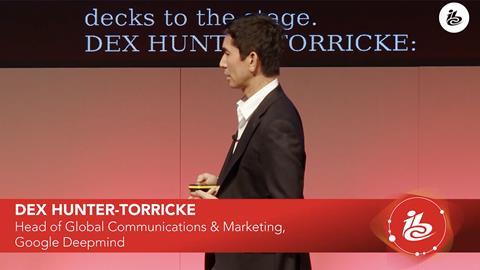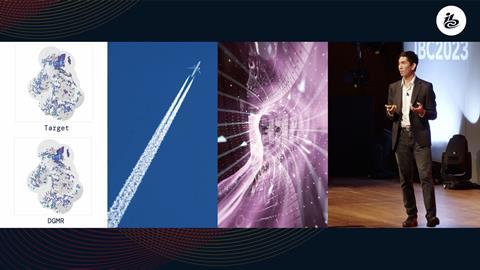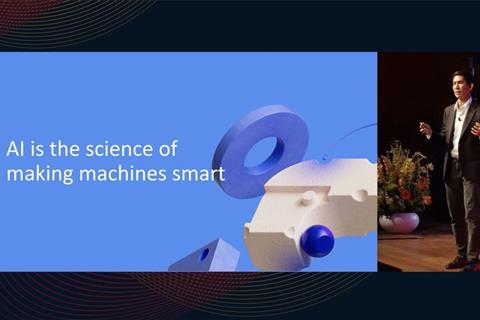Few advancements could cause both the excitement and fear AI elicits - according to some, it’s the solution to humanity’s problems. Others will tell you it’s the beginning of the end of civilisation as we know it. Andrew Williams investigates.
At IBC2023, a Google DeepMind talk covered the state of AI today, and what artificial intelligence could bring to society in the future.

DeepMind is the AI arm of Google and was established in 2010. It recently announced Gemini, the next generation of Google artificial intelligence. However, the talk at IBC2023 by Dex Hunter-Torricke, DeepMind Head of Global Communications and Marketing, took a step back from the tech specifics, to look at how it is affecting, and will affect the way we live and work.
AI is more than chatbots
“When we think about the current era of AI tools, lots of people just gravitate straight towards chatbots but there’s much more to come,” said Hunter-Torricke.
Watch more Delving Deeper: Will AI help us solve humanity’s biggest challenges?
“AI could be one of the most important inventions of the century. This is something that has extraordinary applications across a whole range of fields… I think AI is going to power a whole series of social and economic transformations in the world that are going to have a huge impact on the way all of us live and work. And we know this because previous economic and social transitions have delivered the same kind of impact.”
He compares AI’s potential to that of the industrial revolution of the late 1700s to mid 1800s, and the information revolution that brought us the internet over the last fistful of decades.
Hunter-Torricke calls it the “intelligence revolution” and claimed: “the rate of innovation that is happening today is astonishing. And we will probably see the ripple effects like innovation in our society, in our organisations, in our lives, very, very rapidly.”
The decision-making power of AI
To have a hope of encompassing what it means, a very broad view has to be taken thanks to the huge number of areas in which AI will one day soon play a part. As Hunter-Torricke said, this is about more than just chatbots.

“It’s more than information. We have tools now that will allow us to make better decisions to go and problem-solve in a way that people have never been able to before. And this is something that’s going to enable a whole new set of tools, a new wave of creativity and expression in the world, and also solve some of those fundamental global challenges, the defining challenges that shape society for billions of people around the world,” he said.
Some of the most compelling uses for AI he delves into are those around science and climate change, and how AI can help solve these problems, one currency humanity is not short of.
For example, Google partnered with American Airlines in a project aimed at reducing the environmental impact of aviation, and not in the way you might initially assume.
“Global aviation accounts for about two and a half percent of all CO2 emissions… 35% of that contribution to global warming is created entirely by contrails,” he said.
Contrails are the cloud-like plumes airplanes can create when they fly through cold, clear, humid air. They trap the heat radiating from the Earth, contributing to global warming.
“Over the last six months, Google has partnered with American Airlines to test AI in optimising the routes planes are flying through in order to reduce contrails. American Airlines flew 70 test flights over six months. And after that we used satellite data to look at whether contrails were forming and we were actually able to reduce the formation of contrails by 54%. That’s real potential impact in terms of fighting global warming in the aviation industry, in a single application of artificial intelligence,” he said.
Efficiency in AI
In this situation, AI is used to dramatically improve the efficiency of something in one important area, even if it may decrease it in another. AI handles the data here in a manner that would be highly laborious for a person, or team of people, to do manually.
A comparable AI concept used right now, on Google’s YouTube platform, is indicative of a key way AI will be used in future across broadcast.
“The Flamingo vision language that came from DeepMind is something that’s made it easier for people to find content that they want on YouTube,” said Hunter-Torricke.
“The Flamingo system is able to look at a video and understand what’s happening in that and then append that as metadata to those videos.”
Videos don’t have to be properly named, or have full descriptions, for YouTube’s algorithms to discover what they are about. The AI can see what’s on-screen, much like a personal manually watching content to give it proper content meta tags.
It’s a removal of busywork on an epic scale, when YouTube racks up more than 50 billion views a day, a milestone it reached back in February 2023.
This core tech is also available to the public, through Google’s Lookout app, which analyses images or a phone camera’s view of the world and describes what it “sees.”
“This is something extraordinarily valuable, particularly for folks from a blind or low vision community,” he said.
Fear and power in generative AI
Generative AI is the hottest topic of them all at present, though, for its spectacular ability to appear to create reams of text, images or even computer code seemingly out of nothing more than a brief text prompt.

“Generative AI can have a huge impact across the board on how we make content on how we access information, how we synthesise it so that we get usable and actionable insights and value out of it,” said Hunter-Torricke.
“Everything from changing the way we do communications, the way we develop content and presentations, the way we run meetings, the way we manage projects. All of these things are areas in which AI is going to be showing up in a big way, and changing the way we collaborate.”
Generative AI is also at the root of many serious concerns about whether AI will effectively take people’s jobs, doing the work of marketeers, writers, video editors, artists and many more occupations. However, Hunter-Torricke said “I think that’s very much underselling the value of people.”
“Humans are extraordinarily creative. People will naturally want to see more creativity from humans, and people with really vivid imaginations are going to be using these tools to amplify, to build on the things that humans are really, really good at, imagining and synthesising information in ways that are even more complex than what machines can do. So I expect over the coming years, we’re going to see a lot more content, where AI might play a role, but humans will absolutely be critical for that.”
Despite being about as firmly rooted in AI development as it is possible to be, Hunter-Torricke also said progress at all costs isn’t the right approach to take. “Responsibility, and innovation absolutely have to go hand in hand across all of these innovations driven by AI,” he said.
“We absolutely need to deal with the near-term potential harms. That’s where you get things like misinformation, but we also need to look at a whole bunch of other challenges. There’s a challenge of bad actors and the misuse of AI systems that weren’t designed to do things that are bad, but bad actors in the form of individuals, all the way up to nation states, might choose to use that AI in ways that are ultimately harmful.”
Any powerful tool can be used for ill in the wrong hands, and this brings particular concerns with US elections looming, and UK ones unlikely to be all that far behind.
One of Google’s attempts to counter this is SynthID, which places a digital watermark in AI-generated images that can’t simply be removed using an editing app like Photoshop.
“Synth ID isn’t a silver bullet,” said Hunter-Torricke. “But again, it provides us a very valuable tool, which allows us to then see at least in a certain range of applications, is this something that was created by people or was it created by a system?”
AI brings huge potential and just as huge potential for problems, but it is not going anywhere. We all need to be conscious of where it is headed. Even that may be tricky to keep up with for many. “I think the first is the pace and scale of innovation will probably vastly exceed expectations,” said Hunter-Torricke.
Google DeepMind Head of Global Communications and Marketing talked about Google’s work in AI at a session titled: Delving Deeper: Will AI help us solve humanity’s biggest challenges? during IBC2023, held in Amsterdam.
Read more How can you use AI responsibly?
























No comments yet